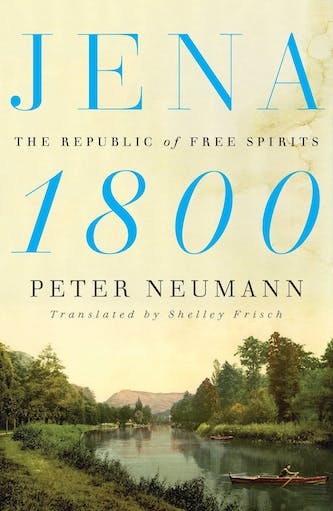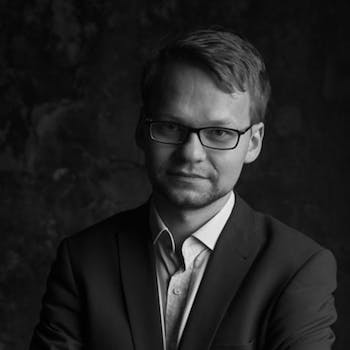Book Review: “Jena 1800” — A Ferocious Hunger for Freedom
By Thomas Filbin
Peter Neumann has written a compelling historical study that focuses on the tumultuous concatenation of a number of imaginative and dynamic thinkers.
Jena 1800: The Republic of Free Spirits by Peter Neumann. Translated from the German by Shelley Frisch. Farrar, Strauss & Giroux, 256 pp., $27.

German language, cultural, and literary studies fell from favor in the United States after World War I and, if they recovered at all, lost their audience again after World War II. One of my former professors, Stanley Vogel, a military veteran of the latter war who did his PhD at Yale in the ’40s, was hired thereafter to teach English at Suffolk University with the proviso that he also cover one section of introductory German. When he arrived on campus he asked the location of the German department. “You are the German department,” he was told, and found but a handful of students waiting for him. This American renunciation of all things German was, of course, our misfortune. It was only later in life that I had the chance to read the German philosophical and literary giants in translation, especially those who flourished during the Enlightenment and Romantic periods. Latin was the lingua franca of the educated for centuries, French the medium of diplomacy, but German was the language of European high culture, music, and the sciences.
Jena is considered by many to be the birthplace of Romanticism in Germany. Poet and author Novalis’s blue flower was the movement’s initial emblem. “He saw nothing there but the blue flower and gazed at it for a long time with indescribable tenderness,” proclaims a Novalis story. Carrying the flower became a badge of earnestness, a cliquish testament to emotion worn by young men as they read or recited such thinkers as Goethe, Schelling, Schlegel, and Tieck. Peter Neumann has written an engaging book about this big cultural shake-up: a considerable accumulation of genius in the late 18th and early 19th centuries had to come together in one place to challenge authority. Complicating the matter: Napoleon was earnestly conducting war via bombardments.
Romanticism and German philosophical idealism stand as the great artistic and intellectual movements of the early to mid-19th century. Jena 1800 details the ideas that inspired, among others, August Wilhelm Schlegel and his brother Friedrich, whose poetry and criticism appeared in the magazine Athenaeum. These calls for freedom shook the foundations of Western Europe. Romanticism rebelled against structure, rigidity, and ideology in favor of passion, intuition, and the authenticating value of personal experience. The poetry of Goethe and Novalis, godfathers of German Romanticism, spurred other writers and thinkers to probe the limits of conventional order by demanding the rigorous questioning of dogmatic belief systems.
Gatherings of flocks of literati and illuminati in particular cities have inspired other books of note over time. Robert McAlmon’s chronicle of Paris in the ’20s, Being Geniuses Together, and James Buchan’s Crowded with Genius, which is about 18th-century Edinburgh, come to mind. These histories emphasize the dramatic possibilities of mental alchemy, and Neumann’s narrative also has an exuberant tone, suggesting that Jena was hosting a grown-up play group of collaborators, questioners, and creators. But the seriousness of their purpose was absolute. This early Romantic literary movement was not a boys’ club: two of the most prominent participants, the novelist Dorothea Schlegel, wife of August Wilhelm, and critic Caroline Schelling, wife of Friedrich Wilhelm Schlegel but later married to Friedrich Schelling, are given appropriate credit. Peripheral characters are also brought in, such as the poet Ludwig Tieck and the philosopher Johann Gottlieb Fichte, who taught at Jena until he was expelled in 1799 after displaying suspicious signs of atheism.
That Romanticism was among the forefathers of German idealism is an accepted premise, but mainly because of its groundbreaking demands for a new start from the perspective of individual consciousness. The Romantic movement’s embrace of ego — a rejection of learned structures in order to embrace epiphanies of emotional awareness — connects the two movements. Notable philosophers Fichte, Schelling, and ultimately Hegel, with their fantastic system building, would have their work challenged by more empirical and positivist thinkers late in the same century. Schelling is an example of a lecturer who provided more heat than light in debates about the nature of reality. “Nature, in Schelling’s thought, functioned as a medium for the mind to recognize itself and take shape; in the human mind, nature opens up our eyes and provides us with the knowledge that it is here. Nature is only another facet of the mind, not a pernicious foreign object,” writes Neumann.

Peter Neumann studied philosophy, political science, and economics in Jena and Copenhagen. Photo: Dirk Skiba
It is fair to speculate if the brilliant poetry of early German Romanticism had a negative effect on German philosophy. Idealist thinkers constructed explanations of the world that had no basis in empirical observation. Rather, these tremendous gusts emanated — with apologies to thinker Dusty Springfield — from the “windmills of their minds.” When Hegel arrived on the scene, he found Schelling to be a natural ally in the support of abstraction. Neumann writes that “the two thought of their purpose as a quest to unveil the ideas within things, to distinguish philosophy from non-philosophy in such a manner that the latter, in the ongoing progression of thinking, would turn out to be philosophy after all.” Over the centuries, philosophy, contrary to subjects such as chemistry, has had problems defining itself. Idealism is an interesting attempt to draw castles in the air, but it neither clarified boundaries or outlasted its proponents.
As a literary movement, Romanticism has proven more durable. Periodic outbursts of cultural rebellion, such as what happened in the ’60s and ’70s, draw on the spontaneity treasured by the Romantic impulse. The imaginative work of the Jena crowd was typified in an 1800 edition of Athenaeum, which featured translations from the Greek by the brothers Schlegel, poems by Novalis, and stories by Dorothea Schlegel, as well as sonnets and reviews. The publication was not about comfort but confrontation. Neumann nicely summarizes its defiant editorial philosophy: “The magazine was a declaration of war on time-honored traditions. ‘Truth’ could never be expressed in a hallway manner out of consideration for others. Vapid unanimity would be unacceptable.”
Neumann has written a compelling tale that focuses on the tumultuous concatenation of a number of imaginative and dynamic thinkers. This mental turmoil was in some ways a reflection of the momentous political change that erupted at the beginning of the 19th century. The flowering of Romanticism challenged the rigid rationalism of the previous century of the Enlightenment. (For example, Goethe posited the concept of “world literature,” demanding that Europe study writing from outside of its borders.) Perhaps the European mind needed to change the channel for a bit to allow humanity to breathe the air of impulse rather than stratagem. And needed to make its cultural vision more international.
What might limit the appeal of this book is that it does not focus on a grand unifying theme. The worship of freedom is implied through the many short anecdotes and sidebars Neumann dedicates to his subjects. The suggestion is that the force of genius is multiplied when enough gifted highbrows are bundled together in energetic proximity. Sometimes quantity and quality go hand in hand. Jena in 1800 was similar to Athens in its Golden Age for thinkers, Medici Florence for Renaissance painters, Paris in the ’20s for Modernism, and New York after World War Two for Abstract Expressionists. A gathering of kindred talented souls can embody the spirit of the age. Or, if you prefer, in the case of Jena 1800, possessing the same Weltanschuung can personify the Zeitgeist.
Thomas Filbin is a freelance book reviewer whose work has appeared in the New York Times Book Review, Boston Globe, and Hudson Review.
